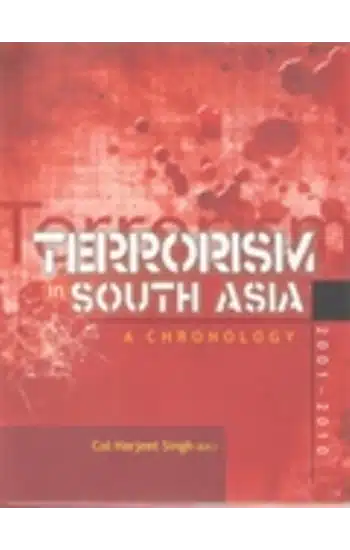
Save: 25%

Save: 25%
TERRORISM IN SOUTH ASIA: A CHRONOLOGY 20012010
Publisher:
| Author:
| Language:
| Format:
Publisher:
Author:
Language:
Format:
₹1,950 ₹1,463
Save: 25%
In stock
Ships within:
In stock
ISBN:
Page Extent:
Terrorism is a major contemporary security problem and will, in all likelihood, remain so for the foreseeable future. The South Asia states are particularly afflicted with this scourge, the reasons for which are manifold. These include disputed borders, disputed areas, and ambiguous as well as inherited administration in parts of the states. The brutal nature of the genesis of Pakistan and Bangladesh ahs made regional relations conflictual and a part of their foreign policy. Added to this are bilateral issues which are perceived as deliberate manipulations to project or impose an image of superiority.
The division of the Indian subcontinent into sovereign states after decolonization has not blurred the historical societal linkages from a common historical past which transcend the legal boundaries . This extends to two major problems for national security as far as South Asia states are concerned. The first is a tendency to suspect the loyalty of minority groups and interpret their urge for human rights and civil liberties as threats to national security. The second is that the assumption of humanitarian concerns of states for the minorities of other states is interpreted as interference in domestic affairs.
Underlying all of these factors is the need to place the threat of terrorism in perspective and context. One way of doing so is to list out all the terrorist incidents that have occurred in the past decade. Terrorism imposes a number of significant costs on individuals, societies and states and thereby substantially changes the economic and social structure of the country. These include maintenance of law and order; humanitarian aid; fiscal; economic; social and cultural costs. Poor governance adds to the problem.
This is a historical moments when the people of South Asia need to recognize that they have a new tryst with destiny. They need to affirm that their security and well being lies not in conflict but in peace and cooperation. Analysis and reflection upon the data provided in this book should provide a basis of a greater understanding o the problem.
Terrorism is a major contemporary security problem and will, in all likelihood, remain so for the foreseeable future. The South Asia states are particularly afflicted with this scourge, the reasons for which are manifold. These include disputed borders, disputed areas, and ambiguous as well as inherited administration in parts of the states. The brutal nature of the genesis of Pakistan and Bangladesh ahs made regional relations conflictual and a part of their foreign policy. Added to this are bilateral issues which are perceived as deliberate manipulations to project or impose an image of superiority.
The division of the Indian subcontinent into sovereign states after decolonization has not blurred the historical societal linkages from a common historical past which transcend the legal boundaries . This extends to two major problems for national security as far as South Asia states are concerned. The first is a tendency to suspect the loyalty of minority groups and interpret their urge for human rights and civil liberties as threats to national security. The second is that the assumption of humanitarian concerns of states for the minorities of other states is interpreted as interference in domestic affairs.
Underlying all of these factors is the need to place the threat of terrorism in perspective and context. One way of doing so is to list out all the terrorist incidents that have occurred in the past decade. Terrorism imposes a number of significant costs on individuals, societies and states and thereby substantially changes the economic and social structure of the country. These include maintenance of law and order; humanitarian aid; fiscal; economic; social and cultural costs. Poor governance adds to the problem.
This is a historical moments when the people of South Asia need to recognize that they have a new tryst with destiny. They need to affirm that their security and well being lies not in conflict but in peace and cooperation. Analysis and reflection upon the data provided in this book should provide a basis of a greater understanding o the problem.
About Author
Reviews
There are no reviews yet.
Related products
RELATED PRODUCTS
Arjun Subramaniam (Set of 2 War Books)
Save: 25%
90 Years of the Indian Air Force: Present Capabilities and Future Prospects
Save: 30%
Afghan Air Wars : Soviet, US and NATO operations, 1979–2021
Save: 25%
Forgotten Warriors: A History of Women on the Front Line
Save: 25%
India and The UN Peace Operations: In Service of Humanity and Global Peace
Save: 30%
Pentagon’s South Asia Defence and Strategic Year Book2012
Save: 25%
Professional Military Education: Making of the 21st Century Warrior
Save: 30%
Wavell’s Command: The Crucible Of War Book 1 (Paperback ) By Barrie Pit
Save: 0%
YOGI ADITYANATH: Blend of Spiritualism and Political Realism
Save: 25%



Reviews
There are no reviews yet.